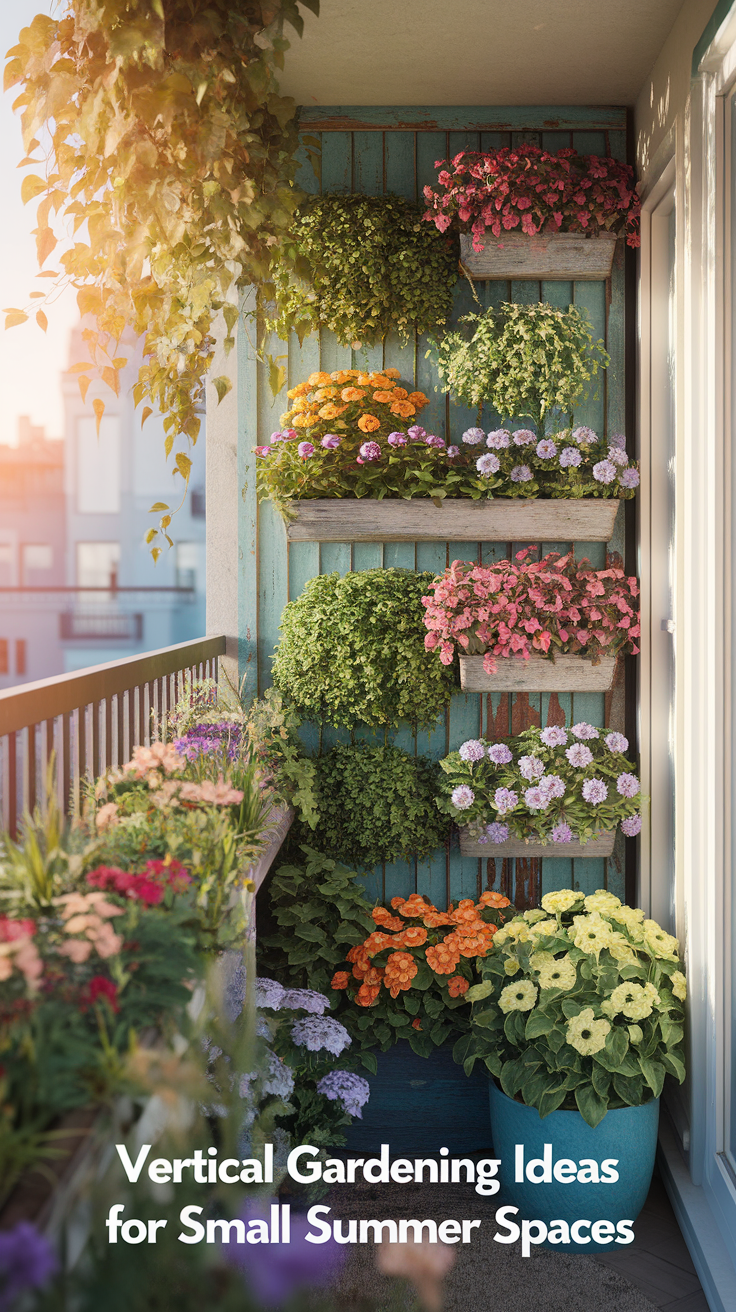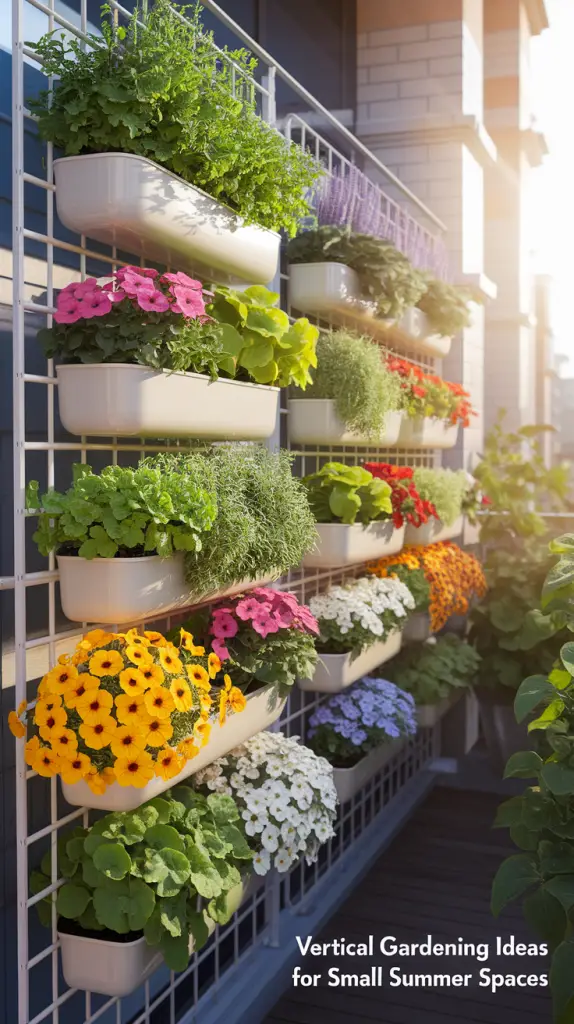Vertical Gardening Ideas for Small Summer Spaces in 2025

Particularly for city people and homeowners wishing to optimize their green space in small spaces, vertical gardening will take front stage in 2025. With the proper arrangement, even a 2-square-foot balcony may become a verdant green haven.
Vertical gardens are providing a tasteful, space-saving way to keep close to nature as urbanization proceeds and outdoor space becomes a premium. This guide will help you design your own vertical sanctuary this summer whether your residence is a microhouse, a townhouse with a tiny patio, or a small apartment.
We will lead you through the best systems for vertical planting, the most appropriate summer plants, detailed setup advice, creative ideas, and frequent mistakes to avoid. All set to maximize your summery surroundings? Let’s explore now.
Why Vertical Gardening Will Be Huge in 2025
Urban gardening is a way of life not only a trend. Vertical gardens have grown increasingly important in sustainable living as more people migrate into cities and outdoor real estate gets smaller and more costly. They are useful as well as lovely.
Vertical Gardening has Several Advantages
- Perfect for little yards, patios, and balconies is space efficiency.
- More greenery and improved oxygen levels translate into better air quality.
- Plants naturally help walls and fences cool down.
- Visual attractiveness gives otherwise unassuming outdoor areas organization and flair.
By use of tax incentives and community projects, cities like New York, San Francisco, and Austin are even promoting vertical green projects.

How to Select the Appropriate Vertical Garden System
Not every vertical garden is built equal. A thriving mini-garden depends on your choosing of the correct system for your goals and location.
Different Kinds of Vertical Gardens Systems:
| System Type | Ideal For | Pros | Cons |
|---|---|---|---|
| Wall-mounted pocket panels | Balconies, patios | Lightweight, easy to set up | May dry out quickly |
| Modular vertical planters | Small yards, porches | Scalable, aesthetic appeal | Pricier than DIY options |
| Hanging tiered pots | Balconies, pergolas | Great drainage, mobile | Limited root space |
| DIY pallet garden | Budget-friendly solutions | Recyclable, customizable | Requires more setup effort |
| Leaning shelf planters | Renters, patios, indoors | No wall drilling needed | Can be bulky in tiny spaces |
To cut maintenance, look for self-watering features or think about including a drip irrigation system.
Top Plants for Vertical Summer Gardens
Selecting appropriate plants for your vertical garden can guarantee its success during summer heat.
Flowering Favorites:
- Petunias: Low-maintenance and brilliant.
- Verbena loves the sun and flowers for months.
- Lobelia introduces texture and color contrast.
Edibles & Herbs:
- Basil loves sun and grows fast.
- Mint: aromatic and insect-repelling.
- Arugula: quick-growing and gives salads some spiciness.
Shade Lovers:
- Boston Ferns: Work best in indirect illumination.
- English Ivy – Traditional trailing style.
As you know? Herbs such as mint and basil not only thrive in vertical gardens but also discourage insect activity.

Detailed Guide for Creating Your Vertical Garden
Although building a vertical garden can appear difficult, with the correct preparation it is shockingly simple.
Step 1: Choose the Ideal Location
- Search for places with four to six hours of sunlight minimum.
- Steer clear of areas susceptible to strong shadow or wind.
Step 2: Install Your Framework
- Choose freestanding frames, hooks, or brackets.
- See whether your railing or wall can support the weight.
Step 3: Get Ready for Your Gardeners
- Add a low weight potting mix.
- Make sure every unit boasts appropriate drainage holes.
Step 4: Water & Plant
- Combine colours and textures.
- Start with easily available drought-resistant plants.
- Water often, especially in dry conditions.

Garden Planning Checklist
- Make sure your vertical garden is designed for success by consulting this useful list:
- Sunlight Access: Depending on the plant, minimum four to six hours of direct or indirect light.
- Strong structure—wall, frame, or stand able to securely support your pots and plants.
- Every planter should include holes; add a drip tray or gravel layer as necessary.
- Choose soil intended for containers to avoid waterlogging from a lightweight potting mix.
- Group plants with like water requirements and sunshine.
- Watering Routine: Plan ahead or install a drip irrigation system for constant maintenance.
- Make sure you can reach all levels for harvesting, pruning, and watering.
- Pest Management: Look for insects often; think about including companion plants for cover.
Pro Tip: Print this checklist and fast remind yourself by hanging it next to your garden.
Five Elegant Vertical Garden Ideas for Limited Spaces
A spectacular can even be created from the smallest balcony or patio.
1. Garden Wall Built from Pallets
Paint an old wooden pallet, hang it on a wall, then cover the voids with herbs and trailing plants.
2. Tiered Planters Hung from Above
Stack pots with cascading flowers or use macramé hangers.
3. Shelf Garden Stair-Step
Arange some herbs and flowers on a three-tiered wooden shelf.
4. Wall Grid Including Pots
Attach S-hooks to a metal wall grid and hang vibrantly colored pots.
5. Planter Tower Made of PVC Pipe
Make columns out of chopped PVC pipes then load them with lettuce or strawberries instead of soil.
Of which one would you start first? Tell us in the comments as well!

Typical Mistakes to Prevent in Vertical Gardening
Even green thumbs fall short occasionally. This is what to be alert for:
- Ignoring drainage could cause root rot from overwatering.
- Plants need the correct orientation; poor sunlight planning is not good.
- Using large containers runs the danger of damaging supports or walls.
- Combining incompatible plants: Some call for sun, others for shade.
Group plants according to like water and light requirements to simplify upkeep.
This Year’s Vertical Gardening Trend:
Smart and fashionable green areas will define 2025.
Warm Trends:
- Smart irrigation systems with sensors of moisture.
- Living walls acting as screens of seclusion.
- Edible walls topped with fruit and salad greens.
- Bamboo and cork are among sustainable materials.
Group Movement in Community:
“Green collectives” created by urban areas are turning shared walls into vertical gardens.
In your city would you join a green wall collective?

Final Thoughts: Summer 2025’s Learnings
You should keep in mind:
- Small summer settings would be ideal for vertical gardens.
- Choose a system depending on your objectives and geography.
- Choose low-maintenance, heat-tolerant flora.
- Plan wisely; sunshine and drainage really do count.
- Style your arrangement; green may be really beautiful.
You have experimented with vertical gardening? Leave comments including pictures and advice.
And if this motivated you, remember to hit share; your neighbors might also wish for a garden wall.
